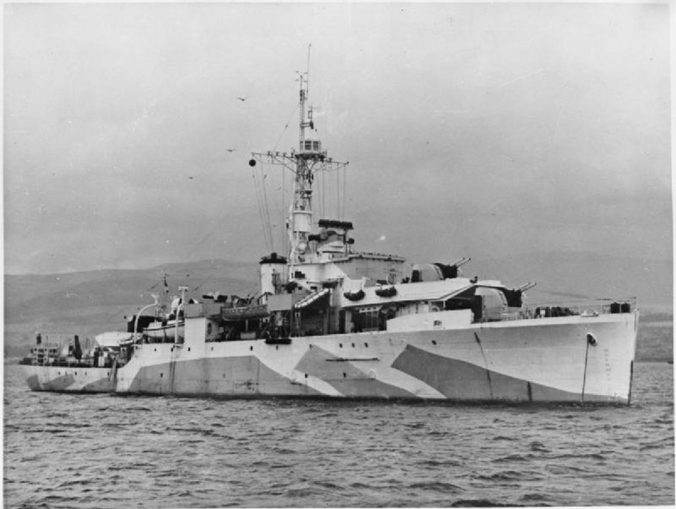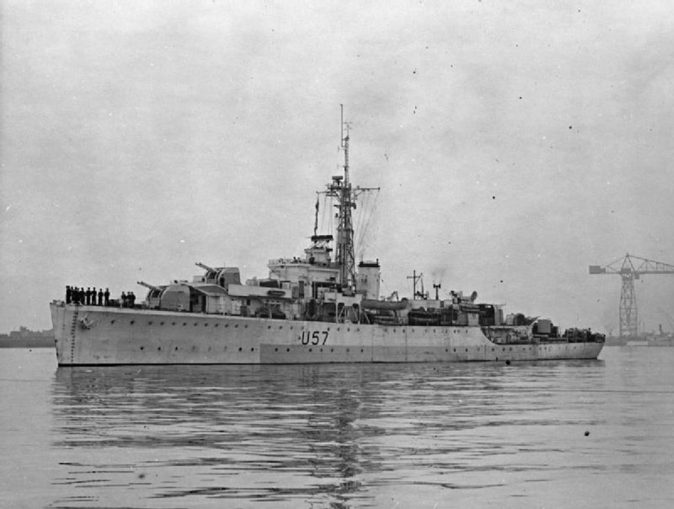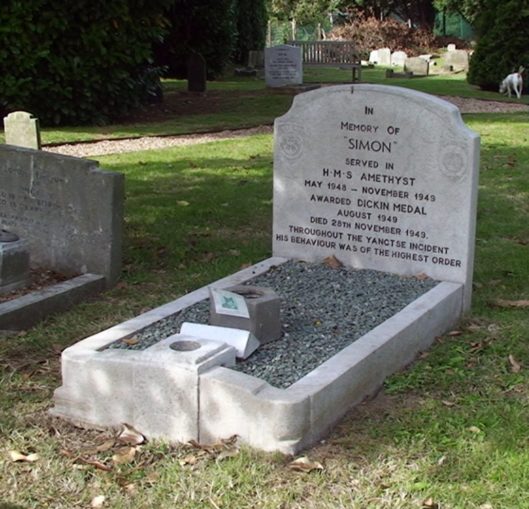
Royal Navy official photographer / Public domain
It’s warm in the room and I’m lying cosily in that semi-trance state, debating whether to close my inner eyelids for ever, or to attempt to explain my small part in the story. I decide to open my eyes and try to sit up. The kindly lady who has been sitting all night with me, sees the movement out of the corner of her eye, puts down her book and looks at me. She smiles.
“I wondered when you would wake up, Simon.”
I hope that she doesn’t stroke my head. Everything hurts, especially my ears. She leans forward in her chair but doesn’t attempt to touch me, for which I’m grateful. I stare into her eyes and her soul. She looks into mine and we’ve made the connection, so I tell her:
…When I was in the first part of my life, I was living rough in the dockyard at Stonecutters Island which is in Hong Kong. I was a mangy cur and in desperate need of something to eat. While I enjoyed killing rats, I could never bring myself to eat their rancid flesh. Someone, either my mother or sister, told me that way out to the west there’s a place for our kind, where lonely old ladies would look after us for ever. I never really met those kind of ladies, just rough, blunt and sweary men who I think were just as kind in their own way. Well, most of them.
We avoided the local dockyard workers who were just as likely to eat us, because they would eat anything. One morning whilst foraging I saw a man, not very old, but not a dockyard worker and for some reason he didn’t frighten me. He spoke a few words in a gentle voice, then picked me up. He smelled of tar soap and tobacco and I came to know him as George Hickenbottom. He carefully put me in a bag and carried me onto a ship and into his mess deck, where I could hear other men.
“What you got there, George? Fuck me, it’s a cat!”
“You can’t keep him here, George. Is it a him?”
“Why not, and I don’t know. Nobody needs to find out, we can put him in a locker during rounds.”
A circle of faces was looking curiously down at me, not hostile but incredulous and friendly.
“He’s not in a good way, George. Poor little sod looks like he could do with something to eat. I’ve got a tin of pilchards in my scran bag.”
“What’s his name?”
George thought about it, “Simon, Simon the ship’s cat.”
And so I became Simon, the Frigate HMS Amethyst’s initially, unofficial ship’s cat. The men of the mess deck spoiled me with titbits, but one of His Majesty’s frigates is a large world to explore and it was only a matter of time before I slipped out of the mess deck into the world of steel, strange smells, men and rats. I grew to like those rough, sweary men and I think they came to like me, because I would leave presents on their beds of the rats I’d killed. I know how grateful they were because they used to shout: “Fucksake, Simon!” The ship’s Captain, Lieutenant Commander Bernard Skinner, liked me so much that he let me sleep in his cap. The beauty about having the run of the ship was that I got to find out everything that was going on, just by curling up in the wardroom when the captain was having his execs meetings. Unfortunately, I couldn’t tell my friends on the lower decks. When we set sail, I watched through a scupper as Stonecutters Island disappeared behind the Amethyst’s wake. I wasn’t going to miss the dangerous dock yard because this was my new life and I was happy with rat catching duties. One of the officers sitting next to me was twiddling my ears, while the captain explained that the ship had orders to go up the Yangtze River to Nanking, to replace the Consort that was guard ship to the British Embassy. Lieutenant-Commander Skinner explained that the mission was very sensitive because the country was in the grip of a civil war. It didn’t mean much to me but the little pieces of rich tea biscuits were nice.
On 20th April 1949 (that’s what was written in the ship’s log), the ship was heading east up the broad, muddy Yangtze river. At 0831 L there was a burst of machine gun fire and a salvo of ten shells fired from the north bank landed in the river, short of the ship. It increased speed and there was no further shelling. With the excitement over, I slunk into the captain’s cabin and fell asleep. At 0930 L as the Amethyst approached Kiangyin, a second Communist Peoples’ Liberation Army (PLA) field gun battery opened fire on the ship. The first shell missed, but the bridge, navigation, power room and the captain’s cabin were hit in quick succession. I wailed as I was hit by shrapnel and remembered nothing more.
I learned later that my friend Lieutenant Commander Skinner was mortally wounded and all the bridge crew were wounded or disabled. As the sailor on the wheel was hit, the ship slewed to port and ran aground. Before he died, Captain Skinner ordered return fire, but the firing circuits had been damaged when the bridge and superstructure were hit. Although wounded himself, First Lieutenant Geoffrey L. Weston took command of the ship. He ordered the guns to fire independently, but because of the way Amethyst was grounded, the forward guns couldn’t be brought to bear on the PLA battery. The stern turret briefly returned fire before it was put out of action. Further Communist shells hit the sick bay, port engine room and after Lieutenant Weston sent a final message: “Under heavy fire. Am aground in approx. position 31.10′ North 119.50′ East. Large number of casualties,” the generator was hit.
Weston gave the order that all but essential crew should evacuate to the southern, Nationalist-held bank. The PLA battery started firing on the men in the water who were swimming for the shore and the evacuation was halted. Fifty-nine ratings and four Chinese mess hands made it to the south side. Two ratings were missing. By the time the Communist shelling stopped at around 1100 L, twenty-two men on the ship had been killed with thirty wounded. The ship was hit at least fifty times and holes below the waterline had to be plugged with hammocks and bedding.
The Flag Officer Far East Station ordered that the Destroyer HMS Consort was to sail down from Nanking to offer assistance to Amethyst. Around the time the shelling stopped, Consort steamed into view at 29 knots, flying seven White Ensigns and three Union Flags. She went past the stranded Amethyst and then turned to attempt to take the frigate under tow. The Communist batteries opened fire on her and the Consort returned fire, silencing most of the enemy batteries. She once again attempted to take Amethyst under tow but was again engaged and her steering damaged. The Consort reluctantly abandoned trying to assist Amethyst and headed downstream with ten killed and fourteen wounded.
On Wednesday 20th April 1949, Air HQ Hong Kong tasked 88 Squadron RAF to prepare a Sunderland flying boat, to offer assistance to HMS Amethyst, an RN Frigate, damaged and aground in the River Yangtze. All available aircraft were made serviceable and at 22:25 hours, Sunderland ML772 took off from Kai Tak bound for the Amethyst. The Sunderland’s captain was Flt Lt Ken Letford DSO and Bar, DFC, and he was accompanied by Group Captain J N Jefferson, Kai Tak’s station commander and 10 others including an RAF doctor, Flight Lieutenant Michael Fearnley. Carrying medical supplies, food and water, the Sunderland had almost reached the beleaguered ship when it was ordered not to alight on the river because of intense gunfire from communist forces.
Just after midnight on 21st April, Amethyst was re-floated by pumping and lightening her and the ship moved up river. The Naval Attaché from Nanking, Lieutenant-Commander Kerans was dispatched to the scene and firstly dealt with the wounded and uninjured who had been sent ashore, ensuring they received appropriate medical attention, before being evacuated. He then took command of HMS Amethyst under the most difficult of circumstances. Kerans didn’t like cats.
The Sunderland had diverted to Shanghai, where it landed just after 4am on April 21. It took off four hours later and on reaching the stranded frigate, made a slow pass unmolested. It landed on the river and taxied towards the Amethyst. A sampan rowed to the flying boat when accurate gunfire began. The RAF doctor with medical supplies transferred to the sampan then to the Amethyst and the Sunderland took off rather than risk destruction.
An attempt to reach the Amethyst by the Cruiser London and Amethyst’s sister ship the Black Swan was thwarted by heavy gunfire as Communist forces had moved in additional batteries. The Communists demanded that Lieutenant Commander Kerans admit that the British state had wrongly invaded Chinese national waters and had fired upon the PLA first, which he of course refused to do. It was a state of impasse and the Amethyst remained stuck and under guard for twelve weeks.
That afternoon I regained consciousness and crawled into a cranny and stayed there for a number of days. Finally hunger forced me to crawl out on deck where someone found me and took me to the sick bay. I had bad burns and four pieces of shrapnel in my rump and thorax. The medical staff cleaned the burns and took out the shrapnel, which hurt me a lot; I was so afraid and in so much pain I tried to claw them. I heard one of the sick bay staff say that I wouldn’t make it through the night so they put me in a box with a blanket, gave me a gentle stroke. “Poor old Simon.” I did what my kind has done for hundreds of thousands of years. I shut down all but my body’s essential functions and purred to release endorphins.
During my period of convalescence, the doctor thought it would be good for the morale of the wounded if I stayed in the sick bay. I was happy to do this and generously shared bunks with the wounded, kneading them before curling up against their warm bodies. Some of them liked my presence so much they would say: “Piss off Simon, give me some room.” But however vital to morale and the recovery of the wounded that I was, when finally fit enough, I had to attend to my primary duty. The ship had become overrun with rats and they were pilfering the food stores in open defiance of good order and discipline. I was shocked that my shipmates could have allowed this to happen while I was Hors de combat. I set about the task of reducing these vermin with alacrity, making sure that Lieutenant-Commander Kerans was kept fully updated on my efforts by my presenting him with evidence of my nocturnal forays into the ship’s holds.
The Breakout

Royal Navy official photographer / Public domain
During the weeks held in the river, HMS Amethyst’s captain made sure that repairs were carried out until the ship was ready to move. At nightfall on 30th July 1949, the ship went into covert battle stations. One of my friends, indistinguishable in his flash hood but well known to me by his scent, carried me to my cardboard box in the sick bay. “Keep your ears down, Simon. Stay down and stay safe.” Amethyst slipped her chain and followed the passenger ship Kiang Lin Liberation in the hope the batteries wouldn’t see the Amethyst. The Communist batteries opened fire on the passenger ship and sank her, with huge loss of civilian lives. At 0500 L 31st July, the Amethyst approached the PLA forts of Par Shan and Woosung, which she slipped past unmolested and rendezvoused with the destroyer HMS Consort. Consort had been sent upriver again, to provide fire support if the forts opened fire on Amethyst. The two ships cleared the mouth of the river at 0715 L and stood down from battle stations. HMS Amethyst then proceeded to Hong Kong where she received the following message from the King:
Please convey to the commanding officer and ship’s company of HMS AMETHYST my hearty congratulations on their daring exploit to re-join the Fleet. The courage, skill and determination shown by all on board have my highest commendation. Splice the mainbrace.
Understandably, because of my role in the “Yangzi Incident,” I was awarded the Dicken Medal and featured in the press and newsreels. At every port we stopped at on the way to the ship’s home, I was given some award or another. Ladies wanted to adopt me, but my shipmates wouldn’t allow it. When I arrived at England I was sent to this quarantine centre in Surrey and my friends continued to visit me, until I could re-join my ship. Unfortunately I have contracted feline enteritis and due to my injuries I am severely weakened. Thank you kind lady for sitting with me, but this time I won’t make it through the night. So that’s my story…
I look at her, she refocuses as though having come out of a trance and she smiles again.
“Good boy, Simon. Have a little rest and hopefully you’ll feel better tomorrow.”
I meow weakly, hunker down and close both sets of eyelids. I’m too tired to purr, but I know that I’m going back to where I can smell the sea. In my little heart I hope I will once again meet with my shipmates, the ones who never left that big, muddy river, especially Lieutenant-Commander Skinner. I hope he has remembered to bring his cap…

Acabashi / CC BY-SA
© Blown Periphery 2017/2020.
The Goodnight Vienna Audio file
Audio Player



